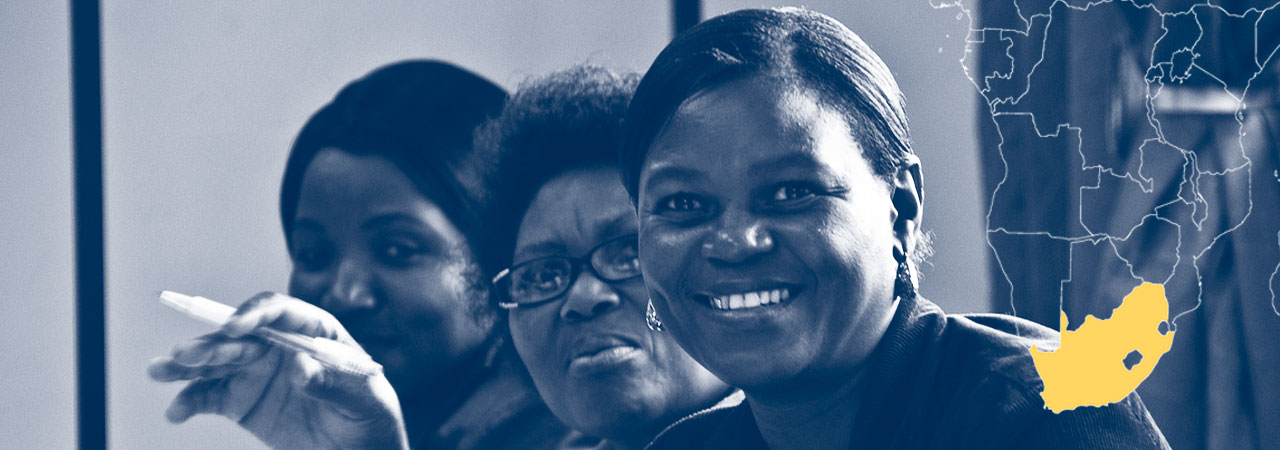World Health Organization guidelines for placing all HIV positive individuals on antiretroviral treatment has intensified the demand for a competent and accessible global health work force that can accommodate 90-90-90 UNAIDS targets for testing, treating, and virally suppressing HIV patients. There is an urgent need to concentrate on effective, differentiated, and cost-efficient service delivery models that embrace high quality patient-centered HIV care as countries adopt and roll out Test and Start. Achieving 90-90-90 will require substantial shifts in how HIV services are staffed and delivered; different solutions, including task sharing, are still needed to reach targets. Over the past decade, a variety of non-physician cadres, such as nurse-midwives, clinical officers, and medical assistants, have contributed to growing evidence of task sharing’s positive contributions to HIV health outcomes in resource-limited settings.
Category: Nancy Puttkammer
Human Resources for Health
The effective diagnosis, care, and treatment of infectious diseases require a skilled and motivated health care workforce, and sustainable systems to educate and train those workers. I-TECH uses a systemic approach to build the skills and knowledge of, and foster attitude changes in, health care staff and those who train and educate them.
The following model outlines I-TECH’s human resources for health-based approach to achieving comprehensive patient-centered care. Each component of the model, including a strong enabling environment, supports an optimized health workforce as the foundation of an effective service delivery system.
Program Highlights
e-Learning/Distance Learning
I-TECH’s distance learning and e-learning projects provide opportunities for health care professionals in resource-limited settings to gain knowledge and skills while minimizing their need to leave the workplace.
I-TECH distance learning projects typically have four goals:
- Increase the capacity of health care workers in resource-limited settings to deliver high quality care and treatment while allowing them to remain in their workplaces to provide services at their sites.
- Build the capacity of ministries of health and governmental institutions to use learning technologies and design blended learning, e-learning, and distance learning programs for health care workforce development.
- In collaboration with the UW Department of Global Health’s E-Learning Program (eDGH), provide technical assistance in effectively using e-learning, blended learning, and distance learning for health care workforce development.
Examples of I-TECH’s e-learning products are available in eDGH’s E-Learning Library.
Program Highlights
Clinical Mentoring
Clinical mentoring is a critical component of I-TECH’s comprehensive approach to training, as it provides a bridge between didactic training and independent clinical practice. Clinical mentoring enables health care workers (HCW) to practice new skills in clinical settings with the support and guidance of a more specialized and experienced clinician. Intensive, practical training is especially important in HIV care and treatment given the diversity of illnesses associated with AIDS and the complexities of antiretroviral therapy (ART).
Typically, the clinical mentor is an experienced clinician-trainer who provides onsite training and consultation on complex cases; supports and enhances high level problem solving, diagnostic, and decision-making skills; leads case discussions; and addresses issues of quality assurance and continuing education. These mentoring activities take place in the context of an ongoing, two-way relationship between the mentor and the clinicians working at the site.
The I-TECH approach to mentoring includes five key components:
- Relationship building. The establishment of a trusting, receptive relationship between the mentor and mentee(s) that evolves and grows over the course of mentorship is the foundation of effective mentoring practice.
- Identifying areas for improvement. Observation and assessment of existing systems, practices, and policies leads to the identification of areas for improvement. I-TECH has developed a number of tools for use during the assessment phase. Information obtained during an assessment helps to inform the establishment of goals and objectives for the mentorship.
- Responsive coaching and modeling of best practices. Mentors must demonstrate proper techniques and model good clinical practice. Targeted activities with mentees may include demonstrating appropriate examination techniques, modeling proper infection control measures, and setting examples for establishing good rapport with patients.
- Advocating for environments conducive to quality patient care and provider development. This component relates to technical assistance in support of systems-level changes at a site. Mentors work with colleagues to enhance the development of clinical site infrastructure, systems, and approaches that can support the delivery of comprehensive HIV care.
- Data collection and reporting. Mentors support the utilization and integration of patient data into clinical practice by encouraging staff to adopt documentation practices that promote effective chronic disease management. Mentors can help demonstrate the utility of data collection and reporting to mentees during mentorship.
The ultimate goal of I-TECH’s clinical mentoring programs is to build the skills of local clinicians to become clinical mentors themselves. Ideally, as the pool of expert HIV/ART clinicians in each country expands, a network of local HIV clinical mentors will emerge to support and train other HIV clinicians with less experience.
Program Highlights
Laboratory Systems
Medical laboratories are a critical component of quality health care and provide essential data for patient care and treatment, disease prevention and control, and public health policy development. I-TECH recognizes laboratory strengthening as a core component of its work. I-TECH’s Laboratory Systems Strengthening (LSS) team’s mission is to improve laboratory operations for optimal patient care and treatment, disease surveillance and response, biosecurity, and policy development. The LSS team fosters the development of sustainable laboratory systems and laboratory capacity in multiple countries throughout the world and comprises staff at the University of Washington (UW) in Seattle, as well as locally based staff. The team leverages partnerships within UW and with external collaborators globally, and engages directly with Ministries of Health and funders to accomplish mutual objectives.
In addition to the highlights below, I-TECH also has had laboratory programs in Cambodia, Côte d’Ivoire, Lao PDR, the Middle East and North Africa, and Zambia.
Program Highlights
Layering Research and Practice in Haiti
The EMR iSanté enables research on population health in Haiti, including the implementation of Option B+. This work was presented at the International AIDS Society Conference in 2015 Continue reading “Layering Research and Practice in Haiti”
Kenya

Since 2005, I-TECH has drawn on expertise from the University of Washington and the University of California, San Francisco, to support the Ministry of Health (MOH) in advancing priorities in the areas of health information systems (HIS), HIS leadership and governance, Global Health Security (GHSA), and evidence-based Infection Prevention and Control (IPC) practices.
I-TECH Kenya’s programs aim to improve the quality of patient care and enable health care facilities to meet their health information, data collection, and reporting needs. I-TECH Kenya’s GHSA funded programs aim to advance the Global Health Security Agenda through strengthening information systems and reporting, and improving IPC in health care facilities.
In all efforts, I-TECH Kenya works closely with the MOH and local partners to develop and implement programs that can be successfully transitioned to local ownership, ensuring sustainable progress toward Kenya’s long-term health goals.
Program Highlights
South Africa

The Republic of South Africa is working to meet the health challenges facing its people, which include a high HIV prevalence compounded by high incidences of sexually transmitted infections (STIs) and tuberculosis.
In 2003, at the request of the National and Provincial Departments of Health and the U.S. Centers for Disease Control and Prevention’s Global AIDS Program, I-TECH began work in South Africa to support the government’s Operational Plan for Comprehensive HIV and AIDS Care, Management, and Treatment.
In anticipation of National Health Insurance, the key health initiatives in South Africa currently focus on strengthening the primary health care system to provide greater access to quality care to the most vulnerable populations and to reach the UNAIDS 95-95-95 goals.
I-TECH in South Africa has worked with government and community leaders, individuals, and communities to improve the effectiveness and sustainability of the South African national HIV, STI, and tuberculosis responses. In all of its efforts, I-TECH has placed an emphasis on program assessment, monitoring and evaluation, and continuous quality improvement with sustainable local involvement to ensure programs can transition to local entities.
Current Program Highlights
Past Programs
Workforce Development in Haiti
It is critical that health care providers receive the necessary training to empower them to improve patient outcomes CHARESS supports both pre-service and in-service training efforts in Haiti. In particular, CHARESS is a key partner of MSPP in maintaining its national clinical guidelines. Continue reading “Workforce Development in Haiti”
Health Information Systems
I-TECH’s Health Information Systems Team lies within the Health Systems Strengthening division. The team has significant capacity in the rapidly expanding field of Health Information Systems for resource-limited clinical settings. I-TECH develops and deploys systems and provides technical assistance and training on electronic medical records, laboratory information management, disease surveillance, national eHealth architecture design, national standards for data transfer and system interoperability, and data use for improved clinical service delivery.
